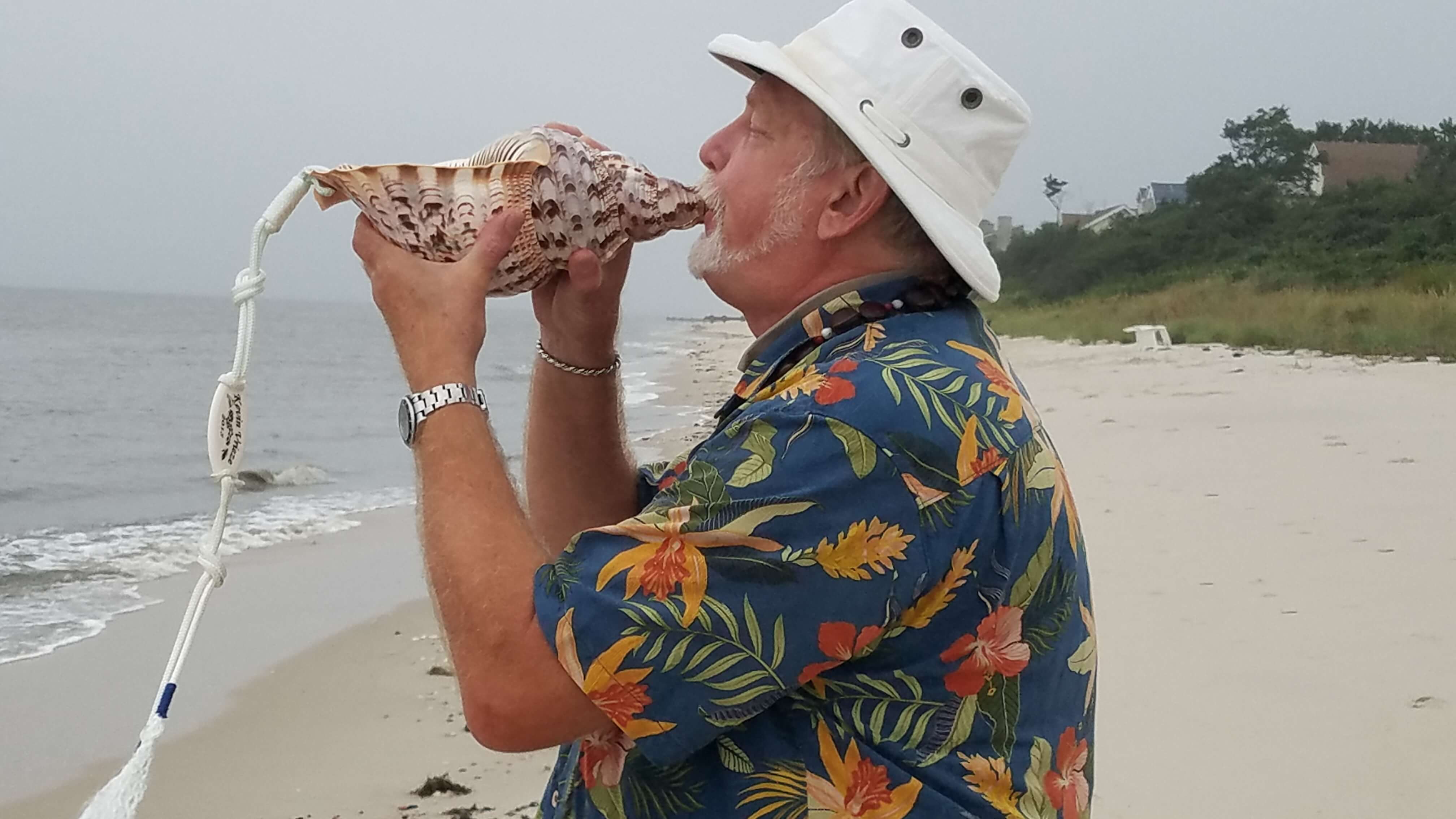VILLAS – On almost any given evening, visitors to a bayside beach here might hear the sounds of a conch shell being blown, as Kevin Vrieze offers blessings and thanks for the day.
Steeped in Hawaiian culture, the blowing of the Pū, the Hawaiian name for the conch shell, is always accompanied by protocol – when, how many times it’s blown and in which direction; all have a complex set of meanings considered so secret they aren’t revealed in print.
“I don’t do rain,” Vrieze said about the sunset ceremony he performs. “In the winter it can be so crystal clear, it’s lovely. I’ll wear gloves to keep my hands warm, but I don’t like the rain.”
Vrieze’s interest in the Hawaiian culture grew out of his playing the ukulele. He played at a festival outside his former home in Maryland, where he met an “amazing” couple from Maui. They performed at the festival, caught Vrieze’s interest, and the rest is history.
“I asked them about their performance and found it very interesting,” he recalled. “As a librarian, I started researching and learned about the history of Hawaii and its culture. I found it to be very interesting and wanted to do more.”
Pū, pronounced “poo,” is a gift from the ocean. According to the Hawaiian culture, the Pū comes out of the life-giving waters with a sound that flows across the ‘Aina (land).
The blowing of the Pū has multiple uses and communicates various meanings in both secular and non-secular traditions, according to Vrieze.
“In ancient times, it was used as a signal device,” he said. “As a ship neared land, they would blow the Pū to seek permission to land. The person on land would respond, giving permission or not.
“It’s also blown at the beginning of the Hawaiian legislative session,” he added, “like a gong.”
Blowing the Pū is sometimes used before a ceremony to mark the official beginning.
“It is used for special events, and there are certain protocols to follow,” Vrieze said. “There are protocols for the sunset as it hits the horizon, and another as it dips below it.”
To blow the Pū is a call to the divine. Its meanings were shared with Vrieze in his Sacred Ceremony. “It isn’t a toy,” he pointed out.
It took Vrieze about a year-and-a-half of practice with a former music teacher before he could blow the shell properly. “It’s not easy to play,” he said. “Once I could play it properly, I had to record it to show that I understood the significance and could play it properly. I am mindful of its cultural aspect and want to do what’s appropriate.”
In modern days, some blow the Pū to say “goodbye” at sunset to end the day and to say Mahalo (thanks).
In addition to sunsets, Vrieze has been asked to blow the Pū at weddings, baby-naming ceremonies, at cultural events and other special events.
This past summer, he blew for a group of Boy Scouts who had biked across the U.S. and had a tire-dipping ceremony at the ocean.
“I said a blessing for everyone, welcoming them home,” he explained. “I try to blend threads of North American culture into the spiritual traditions of the Hawaiian culture.”
Vrieze has plans to visit Hawaii this spring, getting a chance to delve deeper into the state’s culture. “I have friends on several of the islands, so it will be nice to see them and experience their culture first-hand,” he noted.
In the meantime, most sunsets find Vrieze at the beach, “celebrating the day and giving thanks for our blessings.
“Every sunset is the promise of a new dawn,” he said, quoting a line by Ralph Waldo Emerson that he likes to use during a sunset ceremony.
“I often use the following: e pili mau na pomaika I e oe, which means every blessing be with you. Mahalo a ke akua no keia la – praise God for this beautiful day. Aloha oe i a hui hou mahalo – farewell and love to you all and until we meet again, thank you.”
To contact Karen Knight, email kknight@cmcherald.com.
Wildwood Crest – Several of Donald Trump’s Cabinet picks have created quite a bit of controversy over the last few weeks. But surprisingly, his pick to become the next director of the FBI hasn’t experienced as much…








